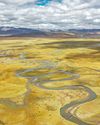
SOIL. MANY OF US pay little attention to it, especially when living in urban areas.
But soil is not just dirt, sand, or mud. To build a climate-resilient and sustainable planet, we must get reacquainted with the soil, a natural resource that is critical to the survival of millions of species, including humans. This precious resource is in danger, and we are to blame.
Globally, an area of soil about the size of Costa Rica is lost every year. In the past 40 years, 33 percent of the Earth’s soils have been lost due to erosion or pollution. In previous regional soil assessments, it was estimated that human-induced soil degradation in Asia accounted for 31 percent of arable land, the highest share of any of the global regions.
The degradation of soil health has largely occurred due to climate change, industrial agriculture, and deforestation. Climate change ushers in extreme drought and flooding, which washes away topsoils or makes soils dry, saline, and infertile. Industrial agriculture has led to the erosion of soil structures as well, with continuous ploughing of fields, crop planting, harvesting, and the use of chemical fertilisers preventing soils from recovering.
According to the UN Food and Agricultural Organization (FAO), deforestation has been identified as the most dominant cause of soil degradation in Asia: Trees help knit landscapes together, and the removal of such trees changes the soil’s structure and abilities, which is detrimental to its health.
Declining Fast
Denne historien er fra AG 06/2021 - 151-utgaven av ASIAN Geographic.
Start din 7-dagers gratis prøveperiode på Magzter GOLD for å få tilgang til tusenvis av utvalgte premiumhistorier og 9000+ magasiner og aviser.
Allerede abonnent ? Logg på
Denne historien er fra AG 06/2021 - 151-utgaven av ASIAN Geographic.
Start din 7-dagers gratis prøveperiode på Magzter GOLD for å få tilgang til tusenvis av utvalgte premiumhistorier og 9000+ magasiner og aviser.
Allerede abonnent? Logg på

A Spectrum Of Scarlet: The Symbolic Red Of Asian Flags
A common thread that unites many Asian flags is the prominent use of red, a colour rich with symbolism

Curry: A World of Flavour, Tradition, and Culture
From its humble beginnings in India, the concept of "curry" has evolved into a culinary language understood around the world

The Power Of Asian Red Fruits - Discover 10 Nutrient-Rich Gems Of The East
In the vast tapestry of Nature, Asia has gifted the world an array of unique and vibrant fruits, particularly those in shades of red. These scarlet-hued gems, packed with flavour and nutrients, not only add a burst of colour to your plate but also carry valuable health benefits. From antioxidant-rich goji berries to the exotic dragon fruit, let's explore some of the most popular red fruits from Asia and discover why they should be part of your diet.

Bhutan: A World Of Its Own
With its majestic monasteries, red-robed monks, charming rural villages, and vibrant festivals, the Kingdom of Bhutan is a Himalayan paradise that promises an enriching travel experience like no other

Take The Red Pill
From the vermilion torii gates of Japan to the famed rust-hued walls of India's Agra Fort, the burgundy robes of Burmese monks to scarlet chillies drying in the Bangladeshi sun, red is the quintessential colour of Asia.

70 Days for Our Land Animals
Raising awareness about conservation, the environment, and the land-dwelling species of the world

The Red Panda
Meet the elusive guardian of the Eastern Himalayas

Revealed Doctor Yellow
Japan Railways' special lemony Shinkansen is a rare sight to behold

The Mighty Yellow
Over 5,000 kilometres long and flowing through nine provinces and autonomous regions, the Yellow River is China's second largest, after the Yangtze, while its basin is deemed the cradle of Chinese civilisation

Wildlife Big Yellow Beauty
The popular "amelanistic" form of the Burmese python is considered among the most beautiful snakes - if that's your sort of thing